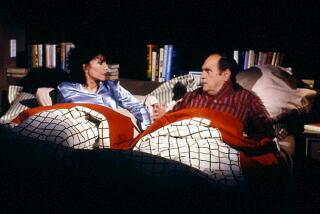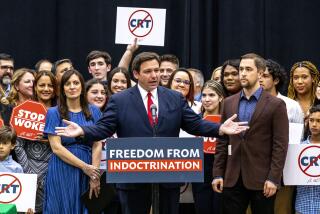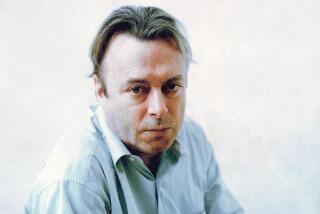Robert Hutchins as a Democratic Institution : UNSEASONABLE TRUTHS: The Life of Robert Maynard Hutchins <i> by Harry S. Ashmore (Little, Brown: $27.50; 616 pp.; 0-316-05396-1) </i>
- Share via
Robert Maynard Hutchins was one of those larger-than-life men of vision about whom Americans like to boast in retrospect, but who in life receive more than their share of misunderstanding, criticism and indeed vituperation from their fellow-citizens. Hutchins, to be sure, gave at least as good as he got. His long and extraordinarily distinguished career as one of America’s great educators began at age 24 as secretary of the Yale Corp., continued through two trail-blazing decades as president of the University of Chicago and ended as president of the ever controversial Center for the Study of Democratic Institutions in Santa Barbara. Notably reluctant to suffer fools (or opponents) gladly, Hutchins taught and fought all his life for the idea of a questing but disciplined liberal-arts education and its by-product--an informed intellectual community. Both, he felt, were vital to the health of American democracy. Many of Hutchins’ ideals, from civil rights to the international rule of the law, ran against the entrenched conventional wisdom of his time, in the ‘40s and ‘50s, but they have been tested and proven since.
The author of “Unseasonable Truths,” Harry Ashmore, was himself a friend and associate of Hutchins, as the long-time executive vice president at the Center in Santa Barbara. He is understandably impressed by his subject--although it would be hard to find a biographer who would not be, faced with this man’s achievements. Ashmore gives Hutchins’ many opponents equal time, however (although sometimes just barely), and tells Hutchins’ complex story fluently and well. This is a badly needed book--comprising as it does a fascinating sub-chapter on America’s intellectual history. (Its considerable length is justified by the broad spectrum of Hutchins’ interests and involvements, not to mention the copious quotes from his subject, who on his own could have supplied the bulk of a second Bartlett’s Familiar Quotations.)
Hutchins was born just before the turn of the century. He was graduated from Yale (Class of ‘21) with two other Americans of singular mold, William Benton and Henry Robinson Luce. All three were ministers’ sons. All three, although their interpretations of this were different, maintained a lifelong devotion to certain values of conscience, integrity and plain speaking that they had learned in the Puritan parsonage. Benton, after starting a formidable advertising agency, Benton & Bowles, went on to become the chairman and guiding genius of Encylopaedia Britannica, where Hutchins ended up as chairman of the board of editors. Luce, of course, was the proprietor of Time, Inc., and his magazines’ most critical editor. The relationship among them was uneasy, because it was almost inevitably competitive. While Benton and Luce tended to look askance at Hutchins as a man who probably couldn’t and shouldn’t ever meet a payroll, Hutchins looked archly at them from his academic pedestal as something better than useful Philistines, although often not much better. Nonetheless, their friendships remained firm. The story of the three is a capsule of the American Century as it might have turned out.
At Yale, Hutchins was almost the epitome of the bright and handsome young man his seniors like to promote. But he was not one to curry favor or compromise, either with his ideals or his promoters. At age 29, the brand-new dean of the Yale Law School, he brashly set out to inject some empirical social science into the stiff legal curriculum.
When he became president of the University of Chicago in 1929, at the ripe age of 30, he wasted little time in shaking the tree there, as he pointed the university toward his ideal of a liberal education. He saw this as a prescribed set of courses in the humanities, the natural sciences, history and philosophy over a two-year period (preferably preceded by a preparatory two years of similar courses in high school), after which the student would receive the BA degree. Then--but only then--would students go on to various forms of specialized education. Scouring the electives of most academic institutions, students at Hutchins’ college were to study from the original texts and participate in extensive discussions of the ideas involved--as junior humanists--before going on to their various work specialties. Predictably, Hutchins was opposed fang-and-claw by most of Chicago’s turf-guarding faculty. He managed to import some significant new academic talent to support him. Yet in 22 years, he never quite got his reforms through. He did succeed in setting a standard of academic excellence and a liberal-arts tradition at Chicago that his foes were unable to stifle. Above all, he gave us the abiding example of a university president who was not afraid to educate and to exercise leadership. These qualities are in short supply these days, among the cautious committeemen and women who putter away at university presidencies.
A significant byproduct of Hutchins’ principate at Chicago was the acquisition of Encyclopaedia Britannica by Hutchins’ friend Benton, bought after the University of Chicago’s timid trustees refused to accept it as a gift. While Benton turned E. B. into a puissant money-maker, Hutchins, as chairman of the board of editors, became its editorial conscience and guide. He presided over the publication of “Great Books of the Western World” and, ultimately, the memorable 15th edition of Britannica in 1974.
By 1951, however, Hutchins had headed West from Chicago to California, where he remained until his death in 1977. He first set up shop in Pasadena as associate director of the newly formed Ford Foundation. But it took only a few years to put a great void of distance between Ford’s nervous board and Hutchins’ ambitious plans to re-state the premises of American democratic dialogue, particularly against the right-wing vigilantism of the McCarthy era. In 1959, Hutchins retreated to Santa Barbara, where he established the hilltop center as a place for enlightened dialogue on the ideas behind the various political and social issues facing the country--a kind of “early warning system” for democracy, as he often put it. Here he gathered about him a group of prominent Amerian scholars and thinkers with widely different backgrounds and specialties. These center fellows would meet several times a week to discuss specific topics--from Constitutional freedoms to the multinational corporation--a kind of intellectual round table. Although some of Hutchins’ intellectual knights were more errant than others, these talks in the center’s heyday could be stimulating and provocative. They were relayed on tape and in print, to a national audience.
Sometimes the dialogues grew to a wider scale, as with the memorable “Pacem in Terris” conference in New York in 1965, where the center gathered about 2,000 of the world’s prominent and concerned people to ponder the issues of war and peace and world governance, at the height of the Cold War. Sometimes they degenerated into trivial academic name-calling, as indeed happened all too often in the faction-ridden last days of the center. Yet for those of us who took part in such meetings, the thing we remember best was the magisterial presiding of Bob Hutchins, always questioning, always searching for new ways to keep the ideas behind the American debate from getting lost in the invective. Unlike most idealists, Hutchins was never boring, with his high irony, self-deprecatory wit and courtly invitation to outrageous thought. The issues he raised remain more pertinent than ever today--the goals and shape of American education not least among them.
More to Read
Sign up for our Book Club newsletter
Get the latest news, events and more from the Los Angeles Times Book Club, and help us get L.A. reading and talking.
You may occasionally receive promotional content from the Los Angeles Times.









